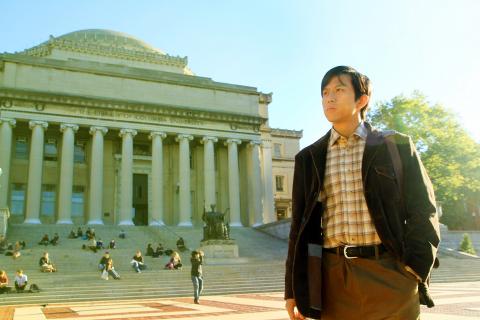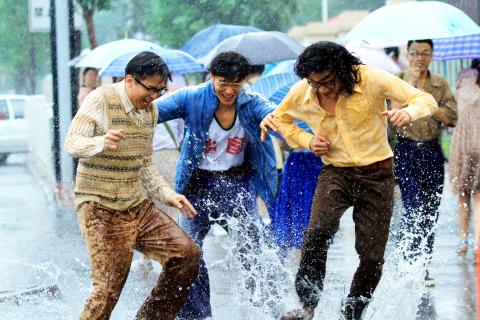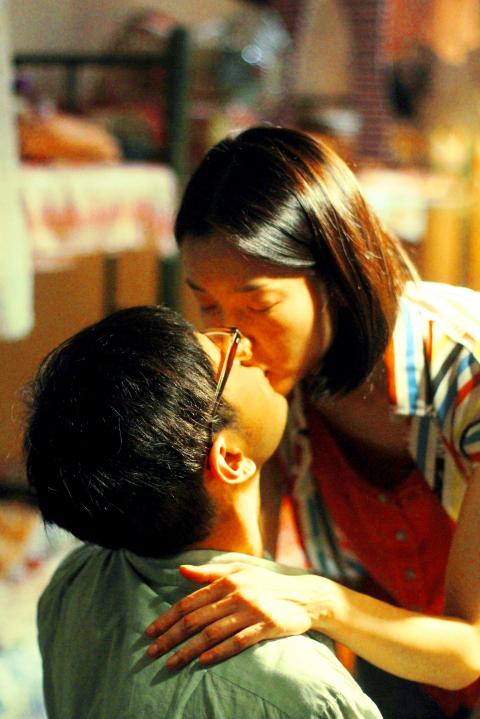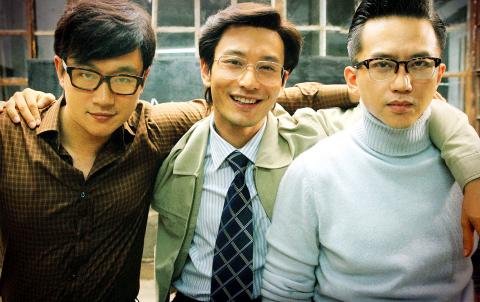After a string of historical action dramas, including The Warlords (投名狀) and Dragon (武俠), Hong Kong director Peter Chan Ho-sun (陳可辛) returns to his favorite theme, love and friendship, with American Dreams in China (海闊天空), an entertaining comedy-drama about three college friends who build a business empire over two decades. The connection of personal stories with society at large recalls Comrades, Almost a Love Story (甜蜜蜜), arguably Chan’s best work, which follows two Chinese whose search for a better life bring them first to Hong Kong and then the US.
However, while the 1996 work tastefully captures the life of the Chinese diaspora and the mood of Hong Kong on the eve of its handover to China, Chan’s latest dramatic offering is more of a cinematic testimony to the growing power of China, a nation now capable of running its own Hollywood and spreading its dogma, non-American style.
In 1980s China, amid sweeping economic reforms, country boy Cheng Dongqing (Huang Xiaoming, 黃曉明), carefree bohemian Wang Yang (Tong Dawei, 佟大為) and the ambitious Meng Xiaojun (Deng Chao, 鄧超) meet and become friends at a university in Beijing. Like their fellow students, who believe that America is their only hope for a better future, the trio prepare for visa interviews to pursue further studies in the US. But only Meng, whose grandfather and father had earned doctoral degrees in America, is able to take off for New York. He tells his friends that he has no intention of returning.

Photo courtesy of Applause Entertainment
Dismissed from his college teaching job and with his girlfriend Mei (supermodel Du Juan, 杜鵑) having left for the US, the disheartened Cheng, together with Wang, sets up New Dream, an English-language school, in an abandoned state-owned factory. Their lessons prove to be a huge hit among Chinese youth thirsting for anything that can help them pass the SAT and GRE exams.
Across the Pacific, Meng waits on tables to make ends meet. Dejected, he returns to China and joins in his old friends’ business venture. As the academy becomes a lucrative national franchise, the trio symbolizes a new generation of entrepreneurs that came of age in 1980s and 1990s China.
However, with success comes friction and dissent. Business divisions increase and alienate the three friends, eventually shattering their friendship. The film reaches its denouement as the three businessmen travel to the US to fight a lawsuit accusing them of intellectual property theft.

Photo courtesy of Applause Entertainment
Narratively speaking, the film tells an engaging, feel-good story about three buddies making it in the big city and embracing each other’s shortcomings in the face of power, money and fame. It plays well with the distinct character types, enjoyably fleshed out by the three Chinese leading thespians, who share sparkling on-screen chemistry. Tong’s romantic disposition makes him the most likeable, while Deng delivers a focused performance as an idealist with a defeated ego. As for Chinese heartthrob Huang, despite his brave move to play against his good looks, he fails to convince as the simple country boy morphing into a sharp businessman.
Iconic pop songs, including Taiwanese pioneering female rocker Julie Su’s (蘇芮) The Same Moonlight (一樣的月光), Greenhouse Girl (花房姑娘) by Chinese rock legend Cui Jian (崔健) and Hong Kong rockers Beyond’s Boundless Oceans Vast Skies (海闊天空), add atmospheric tone to the narration. The character’s lives and their rising fortunes are juxtaposed with important moments in Chinese contemporary history such as the 1999 bombing of the Chinese embassy and Beijing’s failed 2000 Olympic bid. Naturally, the 1989 Tiananmen Square Massacre isn’t mentioned — a calculated commercial omission that will ensure, Chan seems to think, success on the big screen.
In essence, American Dreams in China derives its stamina from a contemporary Zeitgeist: as China has grown to be an important player in world politics and the global economy, people are demanding that their erstwhile American dreams be redefined in Chinese terms. The China-US theme reaches a didactic height when Huang’ character gives a winning speech in front of their American plaintiffs, who are depicted as prejudiced and arrogant. At that moment it becomes blatantly clear that the success of the trio is never the result of American-style individualism, but a collective ideology that finds its roots in the grudges of China’s colonial past.

Photo courtesy of Applause Entertainment
Evidently, the message has been well received by its audience. The film reportedly raked in more than RMB500 million (NT$2.5 billion) in China in less than one month after it opened on May 17.

Photo courtesy of Applause Entertainment

Nine Taiwanese nervously stand on an observation platform at Tokyo’s Haneda International Airport. It’s 9:20am on March 27, 1968, and they are awaiting the arrival of Liu Wen-ching (柳文卿), who is about to be deported back to Taiwan where he faces possible execution for his independence activities. As he is removed from a minibus, a tenth activist, Dai Tian-chao (戴天昭), jumps out of his hiding place and attacks the immigration officials — the nine other activists in tow — while urging Liu to make a run for it. But he’s pinned to the ground. Amid the commotion, Liu tries to

The slashing of the government’s proposed budget by the two China-aligned parties in the legislature, the Chinese Nationalist Party (KMT) and Taiwan People’s Party (TPP), has apparently resulted in blowback from the US. On the recent junket to US President Donald Trump’s inauguration, KMT legislators reported that they were confronted by US officials and congressmen angered at the cuts to the defense budget. The United Daily News (UDN), the longtime KMT party paper, now KMT-aligned media, responded to US anger by blaming the foreign media. Its regular column, the Cold Eye Collection (冷眼集), attacked the international media last month in

A pig’s head sits atop a shelf, tufts of blonde hair sprouting from its taut scalp. Opposite, its chalky, wrinkled heart glows red in a bubbling vat of liquid, locks of thick dark hair and teeth scattered below. A giant screen shows the pig draped in a hospital gown. Is it dead? A surgeon inserts human teeth implants, then hair implants — beautifying the horrifyingly human-like animal. Chang Chen-shen (張辰申) calls Incarnation Project: Deviation Lovers “a satirical self-criticism, a critique on the fact that throughout our lives we’ve been instilled with ideas and things that don’t belong to us.” Chang

Feb. 10 to Feb. 16 More than three decades after penning the iconic High Green Mountains (高山青), a frail Teng Yu-ping (鄧禹平) finally visited the verdant peaks and blue streams of Alishan described in the lyrics. Often mistaken as an indigenous folk song, it was actually created in 1949 by Chinese filmmakers while shooting a scene for the movie Happenings in Alishan (阿里山風雲) in Taipei’s Beitou District (北投), recounts director Chang Ying (張英) in the 1999 book, Chang Ying’s Contributions to Taiwanese Cinema and Theater (打鑼三響包得行: 張英對台灣影劇的貢獻). The team was meant to return to China after filming, but